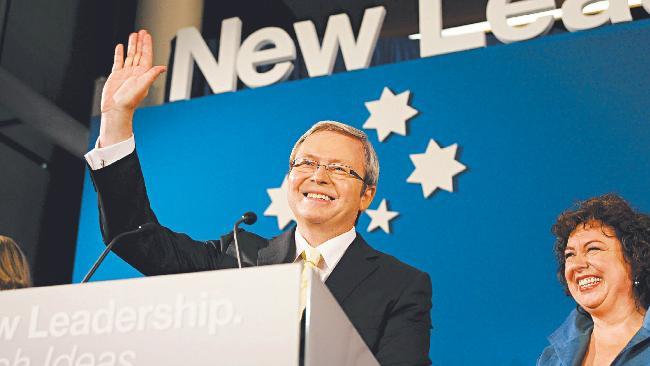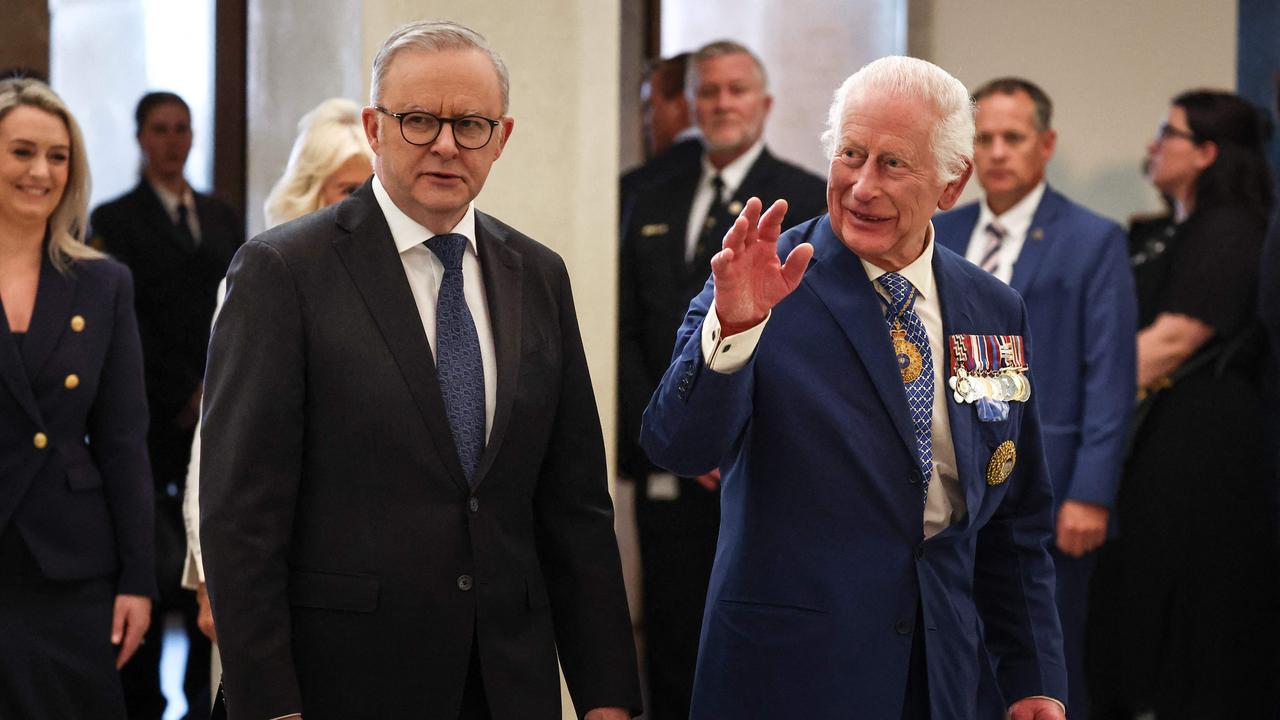The rise and fall of Kevin Rudd
Rudd's standing has fallen from dizzying heights after a series of policy blunders

Rudd's standing has fallen from dizzying heights after a series of policy blunders
KEVIN Rudd has been through a full spectrum of highs and lows during only one term in office. He has been Australia's most popular prime minister, according to Newspoll, and now his support has diminished more quickly than any incumbent before him.
The tale of his rise and fall is almost Shakespearean in the extremes of what he has been through in just three years.
Rudd's prime ministership started with fanfare attached to his apology to indigenous Australians as well as the ratification of the Kyoto Protocol.
These were largely symbolic gestures and easy to do, but they were important to his early support in the wider electorate because the Howard government had refused to do either even when public opinion suggested support for both moves was overwhelming. They fitted with his new-age Kevin07 image without alerting conservatives who supported him that he may not be all he promised to be. Those early steps saw Rudd's support hit dizzying heights and the support Rudd enjoyed sustained itself right through until the global financial crisis when we saw the first signs that voters had stopped to take stock of how able he might be to manage the crisis. This was the first serious test for the new Prime Minister from Queensland, but on the early evidence he appeared to pass it.
It was understandable that the voter reaction to the GFC caused the public to stop and consider the competency of the PM and his government. His decision would affect whether people retained their jobs and managed to retain the affluence that they had got used to during the Howard years.
Given that only a short time earlier John Howard had led a Coalition government with a strong reputation for economic management, the Rudd government had a high bar to reach to be regarded positively for how it handled the crisis.
The rapid speed of the government's response to the GFC saw it handing out cheques and spending money at a fast rate to stave off the downturn other parts of the world faced.
It was argued by the opposition that doing so sustained Rudd's popularity because people were happy to receive money from the government. But they were quick to remind people that it was borrowed money that would have to be paid back and Rudd did well largely because he inherited a strong economy when elected.
The opposition wasn't game to challenge a popular PM handing out money in the first round of the stimulus spending, but when more money was spent in round two, the real divide over economic management between the government and the Coalition became clear.
In time there was a slight drop in Rudd's support on the back of evidence that the budget would be dramatically shifted into the red because of the economic crisis.
Labor MPs found the narrative from the opposition frustrating because they argued that the hole in revenue meant that deficits would be a thing of the present even if money wasn't being spent, but money spent was important to the viability of the economy to withstand the crisis.
Most economists seemed to agree, but in time it was the quality of the spend that became an issue for the government.
From Building the Education Revolution to the botched roof insulation scheme, the speed with which the government tried to find ways to spend money to sustain economic growth was revealed to have done harm, not just economic good.
Nevertheless, throughout the GFC Labor continued to enjoy a dominant position in the polls and Rudd's popularity appeared to be carrying him towards an inevitable second term with an increased majority. He had seen off one Liberal leader, Brendan Nelson, and he was well on the way to outdoing a second, Malcolm Turnbull. The former merchant banker was the right person to remind voters that the Labor Party was spending in a way that wasn't sustainable. In time that narrative would be important to the perception Rudd wasn't the manager of the nation he had promised to be.
Rudd was facing a slow drop in his very high support before Turnbull faced problems over the OzCar Affair, which resulted in his support again climbing back to where it had been. At that time Liberals were looking at the polls and were more concerned about saving the furniture at a 2010 poll.
Perhaps the most dominant factor in Rudd's sustained good polling was the divisions on the other side of the chamber. After Turnbull was rolled as Liberal leader over the emissions trading scheme, that was no longer the case. Surprisingly the Liberals managed to put their divisions behind them and unite around Tony Abbott, who for the first time among the collection of conservative leaders took on Rudd head on.
His plain-speaking style left Rudd looking like an out of touch former bureaucrat, and while Abbott may never have helped himself rise up in the polls, he had a major impact in cutting Rudd's popularity down. He understood the importance of key marginal-seat campaigning and he believed he could squeeze Rudd in regional and outer metropolitan seats where policies such as Labor's softening of rules on refugees were not popular.
In the midst of all this, Rudd had the challenge of having over-promised on a host of issues and having to find a way to sell his initiatives as not an under-delivery of what he said he would do. Health had been a centrepiece of his election campaign -- the claim that he would "fix public hospitals". But the time the health reforms were delivered, they were simply a change in funding arrangements; and with Western Australia holding out on the plan, it wasn't even a national plan.
This meant that while Rudd was still popular, voters were starting to wonder if he was as good as he had promised to be when they decided to vote for him.
A viable opposition led by Abbott put Rudd under pressure and with inexperienced staff around him and a closed-off approach to cabinet decision-making, the Prime Minister started to make some poor moves to start the year. He cut off key powerbrokers such as Mark Arbib and didn't seek counsel from Labor elder statesmen such as John Faulkner.
The most disastrous move was the decision to dump Labor's commitment to an ETS by 2011. That move saw Rudd's personal support fall off a cliff. Labor's primary vote dipped sharply and Rudd's problems really started from that point.
It was the moment Rudd appeared to be less than an outright positive for Labor.
An important part of the problem with Rudd dumping the ETS was that it was first leaked to a journalist. It forced him to hastily convene a press conference and try to explain himself. Having called climate change the greatest moral and economic challenge of our time yet being suddenly willing to walk away from his centrepiece left voters questioning what he really believed in.
The slide in Rudd's personal ratings continued -- on the back of the ETS turnaround alone, his net satisfaction rating went from +9 to -11 in just two weeks.
Rudd had just announced other backflips such as the commitment to build 260 childcare centres.
Once Rudd didn't have the popularity to sustain his leadership, the deep-seated feelings inside the Labor caucus that he was autocratic and didn't listen to advice led to a loss of discipline. Leaks and backgrounding of journalists started to accelerate and the speculation that Rudd might even be challenged ahead of the election, or if he wasn't he would certainly be rolled soon afterwards, began.
It made it hard for Rudd to project an image as a strong leader, and dissatisfaction with him continued to grow.
Then in a bid to improve the standing of the budget and perhaps Rudd personally, he announced that he would be introducing a super-profits tax on the mining industry. It was a play at class warfare that backfired, and the polls, which showed the population split on the merits of the tax, was not what Labor expected.
Rudd announced it with little consultation and without the imprimatur of his colleagues outside of the gang of four and a small number of ministers with portfolio duties relating to the tax. It solidified in people's minds that Rudd wasn't the steady economic conservative that he had billed himself as at the last election.
The challenge for Labor to try to arrest its decline in the polls ahead of the election came down to fixing the problems with its leader and fixing its policy problems on the back of that.
* * *
Rollcall of the nation's leaders who got rolled
JAMES SCULLIN
Prime minister from 1929 to 1932, he had campaigned as the defender of the industrial arbitration system and won a landslide victory, becoming Australia's first Roman Catholic prime minister. He faced numerous scandals and tough patches throughout his leadership, including the forced resignation of his finance minister and the Great Depression. A motion of no confidence was eventually passed in 1931, forcing an early election. Labor was defeated in a massive landslide. Scullin was the last prime minister defeated after only one term.
JOHN GORTON and WILLIAM McMAHON
In March 1971, Malcolm Fraser resigned as defence minister and denounced the then Liberal prime minister John Gorton. In a ballot that followed, Gorton, declaring he had clearly lost the confidence of his colleagues, used his casting vote to see himself out of office. McMahon was elected leader.
BOB HAWKE and BILL HAYDEN
At a shadow ministry meeting on February 3, 1983, embattled Labor leader Bill Hayden gave in to pressure from his colleagues and resigned, making way for the popular former ACTU leader Bob Hawke to take over. Hawke went on to win the election that followed and then became Labor's longest-serving prime minister, winning four consecutive federal elections. Hayden was left to lament that even a drover's dog could have won the prize both men cherished.
PAUL KEATING and BOB HAWKE
In 1991, Hawke got a taste of his own medicine when he was pursued for months by his treasurer, Paul Keating. Keating challenged in June, failed to get the numbers and moved to the back bench. He tried again in December 1991 and won.


